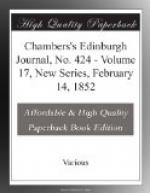To restore this country to the standard of musical eminence which we know from old authorities that it held in the sixteenth century, was the object of Dr Mainzer’s energetic endeavours. The elements, he believed, were not wanting. In Scotland, the musical capacity of the people he found to be above rather than below the average of other nations: all that was wanting was to convince the people of this by the cultivation of their neglected powers. As a preliminary step, he excited those friendly to the object to found the ’Association for the Revival of Sacred Music in Scotland,’ of which he was the director and moving spring; and under its auspices he commenced a course of gratuitous teaching to classes formed of pupils from the parish and district schools of Edinburgh, precentors, teachers, and operatives. The success of these normal classes was so great and so rapid, that at the end of the first year the pupils were able to become teachers in their turn in their own schools or homes; and at the close of the second and third sessions, concerts and rural fetes were held, at which many hundreds of young voices joined in giving true and powerful expression to such works of the great masters as Judas Maccabaeus; while for the delight of their parents’ firesides, and their own moral improvement, the children carried home with them those simple but touching and expressive melodies, composed by Mainzer for their use. At the same time, Mr Mainzer carried on classes for the upper ranks, especially for young children; gave lectures on the history of music from the earliest times and in all countries; and published a talented work on Music and Education, of which very favourable reviews appeared at the time.[1] Mainzer had a peculiar predilection for Scotland: its scenery, its history, its music, all supplied food for his various tastes. With a poetic appreciation of the beauties of nature, he desired no greater pleasure than to wander in perfect freedom among our lochs and hills; and his descriptions of Edinburgh, the Highlands, and Western Islands, which appeared in the Augsburg Gazette, have brought some and inspired more with the wish to visit the Switzerland of Britain. The history and music of Scotland threw fresh light upon each other under his researches. He delighted to trace the reciprocal influence of national events and national music, from the time of the Culdee establishments of the sixth century, when ‘Iona was the Rome of the north,’ down to the Covenanter’s Lament, and the Jacobite songs of the last century. Since these days, the spirit that invented and handed down popular song has passed away with the national and clannish feuds which gave rise to the gathering song and the lament. The age of peace has been heralded in by the songs of Burns and Lady Nairne, the authoress of The Land o’ the Leal, who has done much to restore the taste for our beautiful old melodies, by wedding them to pure and appropriate verse.[2]




